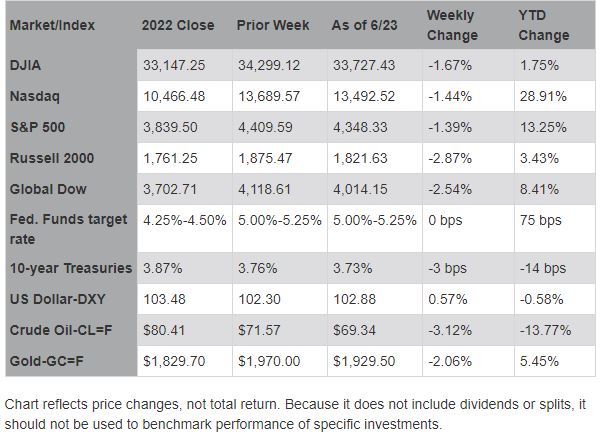Market Week: June 26, 2023
Presented by William Prentice, AWMA®, CFP®, CIMA®
KEY DATES/DATA RELEASES
6/27: Durable goods orders, new home sales
6/28: International trade in goods
6/28: GDP
6/29: Personal income and outlays
THE MARKETS (as of market close June 23, 2023)
Recession fears sent stocks lower during the holiday-shortened week. Each of the benchmark indexes listed here closed in the red, with the small caps of the Russell 2000 and the Global Dow losing over 2.50%. The downturn ended a three-week rally for the Dow, a five-week winning streak for the S&P 500, and an eight-week surge by the Nasdaq. Concerns about rising interest rates and slowing economic growth weighed on equities. Rising inflation in Europe and Asia prompted more interest rate hikes by many central banks, which also dampened market growth. Ten-year Treasury yields dipped lower, while the dollar eked out a gain. Gold prices declined for the second straight week. Crude oil prices declined on fears of waning demand.
Wall Street ended last Tuesday lower as investors awaited House testimony from Federal Reserve Chair Jerome Powell, hoping to glean any clues as to the prospects of further interest rate hikes. Each of the benchmark indexes listed here closed the session lower, with the Dow falling 0.7%, followed by the Global Dow (-0.6%), the S&P 500 (-0.5%), the Russell 2000 (-0.4%), and the Nasdaq (-0.2%). Crude oil prices slid 1.2% to close at around $70.94 per barrel amid concerns over weakening demand. Ten-year Treasury yields declined 4.0 basis points to settle at 3.72%. The dollar was flat, while gold prices dipped lower.
Last Wednesday saw stocks fall for the second straight session, following Federal Reserve Chair Jerome Powell's intimation that interest rate increases will continue until inflation recedes to the Fed's 2.0% target rate. Tech shares slid lower, dragging the Nasdaq down 1.2%. The S&P 500 fell 0.5%, the Dow dipped 0.3%, the Russell 2000 declined 0.2%, and the Global Dow ended where it began. Crude oil prices rebounded, rising nearly 2.0% to reach $72.58 per barrel. Ten-year Treasury yields fell 0.6 basis points to close at 3.72%. The dollar dropped nearly 0.5%, while gold prices fell 0.2%.
Stocks ended last Thursday with mixed results. The Nasdaq (1.0%) and the S&P 500 (0.4%) posted gains, buoyed by rallies in consumer discretionary, information technology, and communications. The small caps of the Russell 2000 (-0.9%) and the Global Dow (-0.4%) slid lower. The Dow was flat. Several central banks, including the Bank of England, raised interest rates, following a spike in inflation data. Ten-year Treasury yields closed at 3.79%, up 7.6 basis points from the previous day. Crude oil prices plunged 4.3%, to $69.38 per barrel, impacted by the aforementioned interest rate hikes. The dollar rose 0.3%, while gold prices fell 1.1%.
Last Friday saw stocks close lower, with each of the benchmark indexes listed here losing value. The Russell 2000 fell the furthest, dropping 1.4%, followed by the Global Dow (-1.1%), the Nasdaq (-1.0%), the S&P 500 (-0.8%), and the Dow (-0.7%). Ten-year Treasury yields slipped 6.0 basis points, settling at 3.73%. Crude oil prices declined 0.4% to end the day at about $69.34 per barrel. The dollar and gold prices advanced.
EYE ON THE WEEK AHEAD
There's plenty of important economic data available this week, including two of the more important economic indicators; gross domestic product and the report on personal income and outlays. The third and final iteration of first-quarter GDP is released this week. The latest data showed the economy advanced at a rate of 1.3%. Also, the report on personal income and outlays includes two important sub-categories: personal consumption expenditures and the personal consumption expenditures price index. Consumer spending rose 0.8% in April, while consumer prices for goods and services increased 0.4%.
Data sources: Economic: Based on data from U.S. Bureau of Labor Statistics (unemployment, inflation); U.S. Department of Commerce (GDP, corporate profits, retail sales, housing); S&P/Case-Shiller 20-City Composite Index (home prices); Institute for Supply Management (manufacturing/services). Performance: Based on data reported in WSJ Market Data Center (indexes); U.S. Treasury (Treasury yields); U.S. Energy Information Administration/Bloomberg.com Market Data (oil spot price, WTI, Cushing, OK); www.goldprice.org (spot gold/silver); Oanda/FX Street (currency exchange rates). News items are based on reports from multiple commonly available international news sources (i.e., wire services) and are independently verified when necessary with secondary sources such as government agencies, corporate press releases, or trade organizations. All information is based on sources deemed reliable, but no warranty or guarantee is made as to its accuracy or completeness. Neither the information nor any opinion expressed herein constitutes a solicitation for the purchase or sale of any securities, and should not be relied on as financial advice. Forecasts are based on current conditions, subject to change, and may not come to pass. U.S. Treasury securities are guaranteed by the federal government as to the timely payment of principal and interest. The principal value of Treasury securities and other bonds fluctuates with market conditions. Bonds are subject to inflation, interest-rate, and credit risks. As interest rates rise, bond prices typically fall. A bond sold or redeemed prior to maturity may be subject to loss. Past performance is no guarantee of future results. All investing involves risk, including the potential loss of principal, and there can be no guarantee that any investing strategy will be successful.
The Dow Jones Industrial Average (DJIA) is a price-weighted index composed of 30 widely traded blue-chip U.S. common stocks. The S&P 500 is a market-cap weighted index composed of the common stocks of 500 largest, publicly traded companies in leading industries of the U.S. economy. The NASDAQ Composite Index is a market-value weighted index of all common stocks listed on the NASDAQ stock exchange. The Russell 2000 is a market-cap weighted index composed of 2,000 U.S. small-cap common stocks. The Global Dow is an equally weighted index of 150 widely traded blue-chip common stocks worldwide. The U.S. Dollar Index is a geometrically weighted index of the value of the U.S. dollar relative to six foreign currencies. Market indexes listed are unmanaged and are not available for direct investment.
Prepared by Broadridge Advisor Solutions. © 2023 Broadridge Financial Services, Inc.


